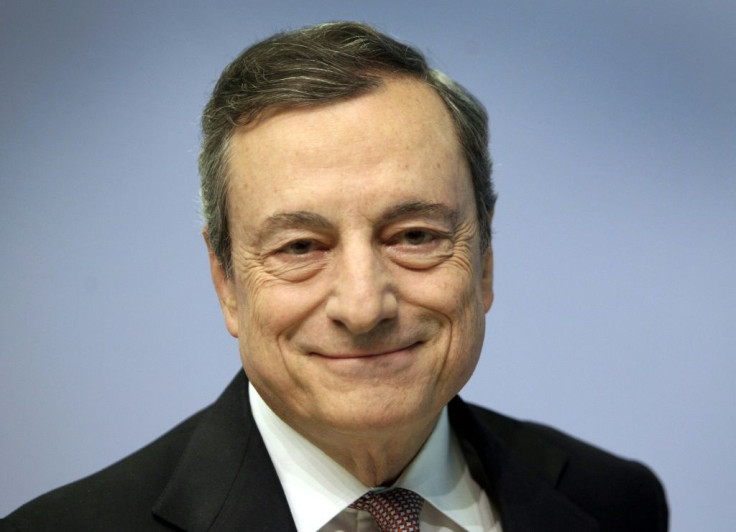ECB Unveils 'big Bang' Stimulus While Urging Govts To Share Load

European Central Bank chief Mario Draghi urged eurozone governments to spend more Thursday, while the Frankfurt institution launched new "big bang" interventions to prop up the economy as the outlook darkens.
Overcoming publicly-aired divisions on the institution's governing council, the Italian economist announced a key interest rate deeper into negative territory, new net purchases of government and corporate debt and support for struggling banks.
While policymakers are confident in their actions, "one thing... was unanimous, consensus, namely that fiscal policy should become the main instrument" for stoking growth and inflation, Draghi said.
The interest rate cut immediately drew ire from US President Donald Trump, who tweeted that ECB policymakers "are trying, and succeeding, in depreciating the Euro against the VERY strong dollar, hurting US exports".
In fact, while the euro fell against the dollar after the ECB announced its monetary policy moves, it was headed back towards earlier levels around $1.102 by the time Draghi's press conference ended around 3:30 pm (1330 GMT).
"We have a mandate, we pursue price stability and we don't target exchange rates, period," Draghi said when asked about Trump's reaction.
In the ECB's definition, "price stability" means inflation just below two percent.
The moves mean Draghi, who will yield his seat to departing International Monetary Fund boss Christine Lagarde on October 31, has set the tone for her first months -- and possibly years -- in office, although he will chair a final meeting next month.
"The final showdown has started with a big bang. The ECB just announced a big policy package to revive the Eurozone economy and to bring inflation back to target," said ING analyst Carsten Brzeski.
'Clear guide post'
Looking in more detail at the measures, the interest rate on banks' deposits with the ECB will drop to -0.5 percent, from -0.4 previously.
Negative rates mean lenders pay the central bank to park their cash in Frankfurt.
Meanwhile the ECB left its two other headline rates unchanged, and said that all three would remain at present or lower levels "until it has seen the inflation outlook robustly converge" towards its just-below-two-percent target.
The "forward guidance" on rates abandons previous language naming mid-2020 as the earliest possible date for a rate hike -- giving way to a "clear guide post" based on the inflation outlook, Draghi explained.
But the biggest question ahead of Thursday was whether the central bank would restart "quantitative easing" (QE) net purchases of bonds, which amounted to 2.6 trillion euros ($2.9 trillion) between 2015 and 2018.
Despite public opposition from governing council members like Germany's Jens Weidmann or Dutchman Klaas Knot, QE will resume from November 1, at a pace of 20 billion euros per month "for as long as necessary" to boost inflation.
In the end "consensus was so broad that there was no need to take a vote," Draghi said.
Pictet Wealth Management strategist Frederik Ducrozet assessed that "the fact that (purchases) will continue “for as long as necessaryâ€, with no end-date, is much bolder than what we had hoped for".
On top of the rates and bond-buying moves, policymakers also agreed a "tiering" system to spare some of banks' deposits the harshest negative rates, which had cost eurozone lenders around seven billion euros per year.
Lastly, the ECB confirmed its latest round of "TLTRO" cheap loans to banks will go ahead from September 19, offering more favourable conditions to those who lend cash on to the real economy.
Slashed forecasts
Draghi pointed to three reasons for the ECB's heavy hand in September: data and surveys showing the eurozone economy already slowing, looming threats like protectionism and Brexit, and downward revisions to the bank's economic forecasts.
The ECB cut its growth forecast for 2019 by 0.1 percentage points, to 1.1 percent, and its inflation outlook the same amount, to 1.2 points, with sharper reductions in the 2020 outlook.
Those projections were based on a "relatively favourable baseline scenario" with no disruption from heightened trade conflicts between the US and China and no Brexit impact, Draghi said.
Meanwhile market expectations for future inflation were becoming "de-anchored" from the ECB's aim, risking a self-fulfilling prophecy as investors bet on lower inflation.
"We really think this package is adequate to anchor inflation expectations" back where they belong, Draghi said.
But he highlighted a planned "review" of the ECB's strategy set to begin under his successor Lagarde that could tweak how the bank targets inflation.
© Copyright AFP 2024. All rights reserved.





















